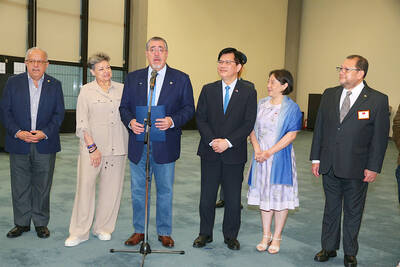Social activists, academics and former politicians have held discussions on the establishment of a new political group to maximize people power and to voice their disgust at the way party politics currently functions in Taiwan.
“The idea is still in its early stages, but one thing is sure: The group will not be a conventional political party like the Democratic Progressive Party (DPP) or the Chinese Nationalist Party (KMT),” former executive director of the Judicial Reform Foundation Lin Feng-jeng (林峰正), who has been actively involved in the campaign, told the Taipei Times yesterday.
Among the groups and individuals involved in the discussions were former DPP chairman Lin Yi-xiong (林義雄), Academia Sinica research fellow Huang Kuo-chang (黃國昌) and activist group Citizen 1985, Lin said.
Those at the meeting hope the deliberation of policy, rather than party interests and elections, will be placed higher on the national political agenda.
The campaign was initiated for a number of reasons, Lin added.
He said that “the energy generated by social movements appears to have reached its peak and has not received sufficient positive feedback after three decades of work.”
Social activists “have not witnessed any positive effects of competition between political parties despite the two regime changes Taiwan has been through,” Lin said.
Advocates for social change have mostly intentionally stayed away from party politics, Lin said, adding that most found that this approach did not help them achieve their goals.
Lin said most people he talked to were especially disappointed at the DPP, a traditional ally of social activists and not-for-profit organizations, saying that the party was afraid of being “too progressive” on various social issues and hurting its election chances.
“The truth is that the DPP has now fallen behind civil groups on issues of environmental protection, pension reform and the cross-strait service trade agreement, to name but a few,” Lin said.
The planned political group has no timetable on its establishment and naming, but does not rule out participating in the legislative elections in 2016 to vie for at-large legislative seats, Lin said.
With regards to the group’s position on independence and unification, an issue that is almost certain to be raised, Lin said that the group would take a different approach to the issue.
“The consensus we’ve had so far is that our sovereignty should not be interfered with by exterior forces. Safeguarding Taiwan’s sovereignty is more important to us than the independence-unification issue,” he said.
If established, the group could have the potential to compete for voter support with the nation’s main parties, the DPP, the KMT, the Taiwan Solidarity Union (TSU) and the People First Party (PFP).
Lin said if the group was to participate in elections, it would try to garner nonpartisan support rather than pattern itself after the DPP-TSU model.
“The TSU simply chipped voter support away from the DPP, which is not helpful in changing the domestic political map,” Lin said.
We don’t want that to happen,” he added.

Greenpeace yesterday said that it is to appeal a decision last month by the Taipei High Administrative Court to dismiss its 2021 lawsuit against the Ministry of Economic Affairs over “loose” regulations governing major corporate electricity consumers. The climate-related lawsuit — the first of its kind in Taiwan — sought to require the government to enforce higher green energy thresholds on major corporations to reduce emissions in light of climate change and an uptick in extreme weather. The suit, filed by Greenpeace East Asia, the Environmental Jurists Association and four individual plaintiffs, was dismissed on May 8 following four years of litigation. The

A former officer in China’s People’s Liberation Army (PLA) who witnessed the aftermath of the 1989 Tiananmen Square massacre has warned that Taiwan could face a similar fate if China attempts to unify the country by force. Li Xiaoming (李曉明), who was deployed to Beijing as a junior officer during the crackdown, said Taiwanese people should study the massacre carefully, because it offers a glimpse of what Beijing is willing to do to suppress dissent. “What happened in Tiananmen Square could happen in Taiwan too,” Li told CNA in a May 22 interview, ahead of the massacre’s 36th anniversary. “If Taiwanese students or

DIPLOMACY: It is Guatemalan President Bernardo Arevalo’s first visit to Taiwan since he took office last year, while Eswatini’s foreign minister is also paying a visit A delegation led by Guatemalan President Bernardo Arevalo arrived in Taiwan yesterday afternoon and is to visit President William Lai (賴清德) today. The delegation arrived at Taiwan Taoyuan International Airport at 4:55pm, and was greeted by Minister of Foreign Affairs Lin Chia-lung (林佳龍). It is Arevalo’s first trip to Taiwan since he took office last year, and following the visit, he is to travel to Japan to celebrate the 90th anniversary of diplomatic relations between the two countries. Arevalo said at the airport that he is very glad to make the visit to Taiwan, adding that he brings an important message of responsibility

About 3,000 people gathered at events in Taipei yesterday for an annual candlelight vigil commemorating the 1989 Tiananmen Square Massacre, a brutal crackdown by Chinese authorities on a student-led demonstration in Beijing on June 4 36 years ago. A candlelight vigil organized by the New School for Democracy and other human rights groups began at 7pm on Democracy Boulevard outside Chiang Kai-shek Memorial Hall, with the theme "Resist Transnational Repression, Defy Totalitarianism." At about 8pm, organizers announced that about 3,000 people had attended the event, which featured brief speeches by human rights advocates from Taiwan and China, including Hong Kong, as well